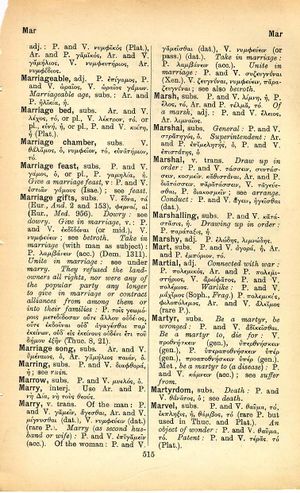marry: Difference between revisions
From LSJ
ἤκουσεν ἐν Ῥώμῃ καὶ ἀρσένων ἑταιρίαν εἶναι → he heard that there was also a fellowship of males in Rome (Severius, commentary on Romans 1:27)
(CSV4) |
m (Woodhouse1 replacement) |
||
| Line 1: | Line 1: | ||
{{Woodhouse1 | {{Woodhouse1 | ||
|Text=[[File:woodhouse_515.jpg|thumb|link={{filepath:woodhouse_515.jpg}}]] | |Text=[[File:woodhouse_515.jpg|thumb|link={{filepath:woodhouse_515.jpg}}]] | ||
Use Ar. and P. νὴ Δία, νὴ τοὺς θεούς. | ===interjection=== | ||
Of the man: P. and V. γαμεῖν, ἄγεσθαι, Ar. and V. μίγνυσθαι (dat.), V. νυμφεύειν (dat.) (rare P.). | Use [[Aristophanes|Ar.]] and [[prose|P.]] νὴ [[Δία]], νὴ [[τοὺς θεούς]]. | ||
Of the woman: P. and V. γαμεῖσθαι (dat.), V. νυμφεύειν (or pass.) (dat.). | ===verb transitive=== | ||
Of the man: [[prose|P.]] and [[verse|V.]] [[γαμεῖν]], [[ἄγεσθαι]], [[Aristophanes|Ar.]] and [[verse|V.]] [[μίγνυσθαι]] (dat.), [[verse|V.]] [[νυμφεύειν]] (dat.) (rare [[prose|P.]]). | |||
[[marry]] ([[as second husband or wife]]): [[prose|P.]] and [[verse|V.]] [[ἐπιγαμεῖν]] (acc.). | |||
Of the woman: [[prose|P.]] and [[verse|V.]] [[γαμεῖσθαι]] (dat.), [[verse|V.]] [[νυμφεύειν]] (or pass.) (dat.). | |||
[[take in marriage]]: [[prose|P.]] [[λαμβάνω]], [[λαμβάνειν]] (acc.). | |||
[[unite in marriage]]: [[prose|P.]] and [[verse|V.]] [[συζευγνύναι]] ([[Xenophon|Xen.]]). [[verse|V.]] [[ζευγνύναι]], [[νυμφεύειν]], [[παραζευγνύναι]]; see also [[betroth]]. | |||
}} | }} | ||
Revision as of 08:51, 20 May 2020
English > Greek (Woodhouse)
interjection
Use Ar. and P. νὴ Δία, νὴ τοὺς θεούς.
verb transitive
Of the man: P. and V. γαμεῖν, ἄγεσθαι, Ar. and V. μίγνυσθαι (dat.), V. νυμφεύειν (dat.) (rare P.).
marry (as second husband or wife): P. and V. ἐπιγαμεῖν (acc.).
Of the woman: P. and V. γαμεῖσθαι (dat.), V. νυμφεύειν (or pass.) (dat.).
take in marriage: P. λαμβάνω, λαμβάνειν (acc.).
unite in marriage: P. and V. συζευγνύναι (Xen.). V. ζευγνύναι, νυμφεύειν, παραζευγνύναι; see also betroth.

